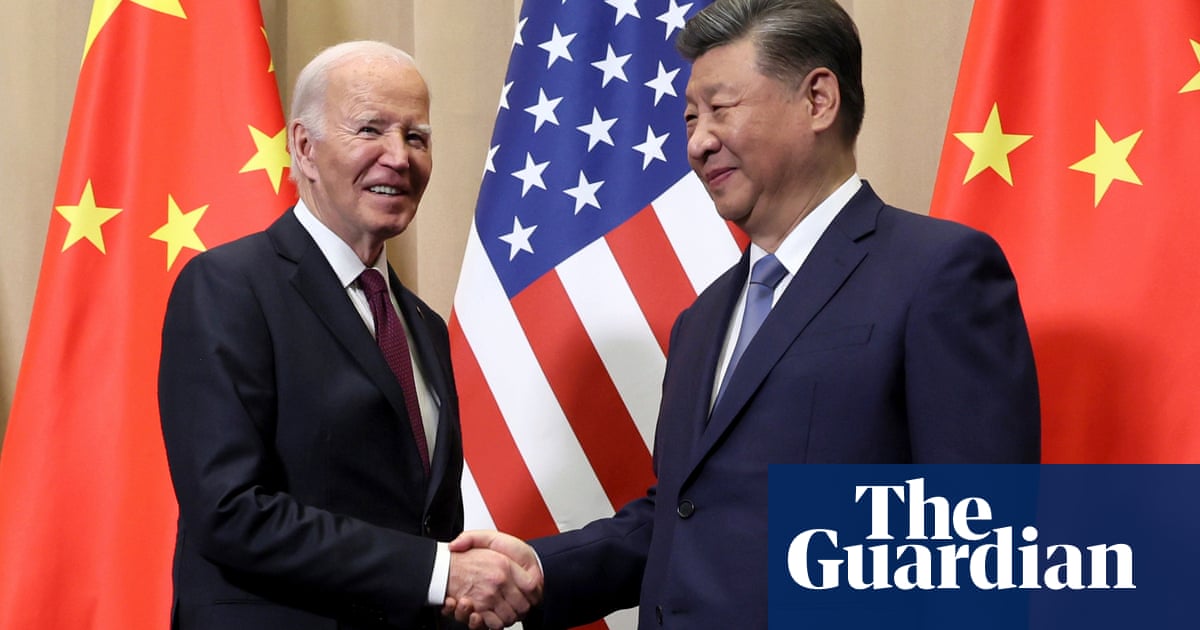
Joe Biden met with Xi Jinping on Saturday afternoon, coming to the agreement that human beings and not artificial intelligence should make decisions over the use of nuclear weapons, according to the White House.
In what is believed to be the last meeting between the two leaders before Donald Trump assumes the US presidency, the two met at a hotel on the sidelines of the annual Asia-Pacific Economic Cooperation summit in Peru, where they shook hands before each delivering opening remarks on the China-US relationship.
“The two leaders affirmed the need to maintain human control over the decision to use nuclear weapons,” the White House said in a statement. “The two leaders also stressed the need to consider carefully the potential risks and develop AI technology in the military field in a prudent and responsible manner.”
The Chinese foreign ministry did not immediately respond to a request for comment.
It was not clear whether the statement would lead to further talks or action on the issue. But it nonetheless marks a first-of-its-kind step between the two countries in the discussion of two issues on which progress has been elusive: nuclear arms and artificial intelligence.
Washington has been pushing Beijing for months to break a longstanding resistance to nuclear arms talks.
The two countries briefly resumed official-level talks over nuclear arms in November but those negotiations have since stalled, with a top US official publicly expressing frustration regarding China’s responsiveness.
Formal nuclear arms control negotiations have not been expected any time soon, despite US concerns about China’s rapid nuclear weapons buildup, even though semi-official exchanges have resumed.
Biden met on Friday with Yoon Suk Yeol, the South Korean president, and Shigeru Ishiba, the Japanese prime minister, and affirmed the alliance among the three countries. The three leaders agreed that “it should not be in Beijing’s interest to have this kind of destabilizing cooperation take place in the region”, a senior administration official said in a briefing on background.
Trump’s imminent return to the White House casts a dark shadow over the conversation as it remains unclear what his second term will mean for the relationship between the US and China.
On the campaign trail, Trump touted a hawkish approach to China, promising to increase tariffs to 60% on Chinese imports, which could be as much as $500bn worth of goods. Trump has also promised to end Russia’s war in Ukraine “in 24 hours”, which some fear means decreasing the flow of military aid to Ukraine or pushing the country to lose territory to Russia. A general backing away from the conflict could give room for China to step up as an intermediary, increasing its presence on the global stage.
Among Trump’s blitz of cabinet nominee announcements was the appointments of Florida senator Marco Rubio as secretary of state and Republican representative Mike Waltz as national security adviser, both of whom have have voiced hawkish views on China.
Xi congratulated Trump on his election win earlier this month, saying that their two countries must “get along with each other in the new era”, in a statement.
“A stable, healthy and sustainable China-US relationship is in the common interest of both countries and is in line with the expectations of the international community,” Xi said.
But in prepared remarks at Apec earlier in the week, Xi took on a more foreboding tone, saying that the world has “entered a new period of turbulence and transformation” and proffered vague warnings of “spreading unilateralism and protectionism”.
Adding more uncertainty to the relationship between the two countries, US officials have been on edge in recent weeks about an FBI investigation showing that the Chinese government tried to hack into US telecommunications networks to try to steal the information of American government workers and politicians. Officials said last month that operations linked to China targeted the phone of Trump and running mate JD Vance, along with staff of Kamala Harris.






